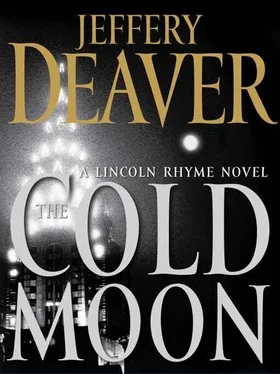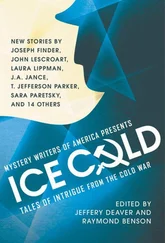Dance smiled. "I know I did. But he's not sure what to make of me."
Another pause. "He likes his evidence."
"Everybody has their weaknesses."
The detective laughed. He hit the siren button and they sped through a red light.
As he drove, Dance glanced at him, watched his hands and eyes, listened to his voice. She assessed: He's truly obsessed with getting the Watchmaker, and the other cases undoubtedly sitting on his desk now are as insubstantial as steam. And, as she'd observed when he was in her class yesterday, he was dogged and savvy, with no problem taking as much time as he needed to understand a problem or to get an interrogation technique right; if anybody grew impatient with him, well, that was their problem.
His energy's nervous but very different from that of Amelia Sachs, who has harm issues. He grumbles out of habit but he's essentially a very content man.
This was something Dance did automically, the analysis. A gesture, a glance, an offhand statement became to her another piece of that miraculous puzzle that was a human being. She was usually able to shut it off when she wished-it's no fun to be out for a Pinot Grigio or Anchor Steam beer and finding yourself analyzing your drinking buddies (and it's a lot less fun for them). But sometimes the thoughts just flowed; this habit went with the territory of being Kathryn Dance.
The people addict…
"You have a family?" he asked.
"Two children, yes."
"And what's your husband do?"
"I'm a widow." Dance's job was recognizing the effect of different tones of voice, and she now delivered these words in a particular way, both offhand and grave, which he would take to mean "I don't want to talk about it." A woman might grip her arm in sympathy; Sellitto did what most of his sex would: muttered a genuine but awkward "sorry" and moved on. He began talking about the evidence they'd found in the case and the leads-which were primarily nonleads. He was funny and gruff.
Ah, Bill…Know what? I think you'd've liked this guy. Dance knew that she did.
He told her about the store where it was likely the clocks came from. "I was saying, we don't think this Hallerstein's the doer. But that doesn't mean he's not involved. There's a chance this could get a little, you know, hairy."
"I'm not armed," Dance pointed out.
The laws about carrying guns from one jurisdiction to another are very strict and most cops are prohibited from bringing weapons from their home state to another. Not that it mattered; Dance had never fired her Glock except on the range and hoped to be able to say the same at her retirement party.
"I'll stay close," Sellitto reassured.
Hallerstein's Timepieces sat by itself in the middle of a gloomy block next to some wholesaler storefronts and warehouses. She eyed the place. The facade of the building was covered with scabby paint and grime but inside Hallerstein's shop window, protected by thick steel bars, the displayed clocks and watches were immaculate.
As they walked to the door Dance said, "If you don't mind, Detective, you establish the credentials, then let me handle things. That okay?"
Some cops, on their local turf, would've had a problem with her taking over. She'd sensed, though, that Sellitto would not (he had self-confidence to burn) but she needed to ask the question. He replied, "It's your, you know, ball game. That's why we called you."
"I'm going to say some things that sound a little odd. But it's part of the plan. Now, if I sense he's the perp, I'll lean forward and intertwine my fingers." A gesture that would make her more vulnerable and put the killer subconsciously at ease-less likely to go for a weapon. "If I think he's innocent, I'll take my purse off my shoulder and put it on the counter."
"Got it."
"Ready?"
"After you."
Dance pushed a button and they were buzzed into the shop. It was a small place, filled with every kind of clock imaginable: tall grandfather clocks, similar but smaller tabletop clocks, ornate sculptures containing timepieces, sleek, modern-style clocks, a hundred others, as well as fifty or sixty pristine watches.
They walked to the back, where a stocky man, balding, around sixty, was watching them cautiously from behind a counter. He was sitting in front of a dismantled clock mechanism that he was working on.
"Afternoon," Sellitto said.
The man nodded. "Hello."
"I'm Detective Sellitto with the police department and this is Agent Dance." Sellitto showed his ID. "You're Victor Hallerstein?"
"That's right." He pulled off a pair of glasses with an extra magnifying lens on a stalk at the side and glanced at Sellitto's badge. He smiled, with his mouth, though not his eyes, and he shook their hands.
"You're the owner?" Dance asked.
"Owner, right. Chief cook and bottle washer. I've had the store for ten years. Same location. Almost eleven."
Unnecessary information. Often a sign of deception. But it also could simply have been offered because he was uneasy at the unexpected appearance of two cops. One of the most important rules in kinesics is that a single gesture or behavior means very little. You can't accurately judge a response in isolation but only by looking at "clusters"-for instance, the body language of crossing one's arms has to be considered in light of the subject's eye contact, hand movement, tone of voice and the substance of what he's saying, as well as his choice of words.
And to be meaningful, the behavior has to be consistent when the same stimuli are repeated.
Kinesic analysis, Kathryn Dance would lecture, isn't about home runs; it's about a consistently well-played game.
"How can I help you? Police, huh? Another robbery around the neighborhood?"
Sellitto glanced at Dance, who didn't respond but gave a laugh and looked around. "I have never seen so many clocks in one place in my life."
"Been selling them for a long time."
"Are these all for sale?"
"Make me an offer I can't refuse." A laugh. Then: "Seriously, some I wouldn't sell. But most, sure. Hey, it's a store, right?"
"That one is beautiful."
He glanced at the one she was indicating. An Art Nouveau style in gold metal, with a simple face. "Seth Thomas, made in nineteen oh five. Stylish, dependable."
"Expensive?"
"Three hundred. It's only gold plate, mass produced… Now, you want expensive?" Hallerstein pointed to a ceramic clock, in pink, blue and purple, painted with flowers. Dance found it irritatingly gaudy. "Five times as much."
"Ah."
"I see that reaction. But in the clock collecting world, one man's tacky is another man's art." He smiled. The caution and concern weren't gone but Hallerstein was slightly less defensive.
She frowned. "At noon what do you do? Wear earplugs?"
A laugh. "Most of them, you can shut the chimes off. The cuckoos're the ones that drive me crazy. So to speak."
She asked a few more questions about his business, filing away a library of gestures and glances and tones and words-establishing the baseline for his behavior.
Finally, keeping her tone conversational, she asked, "Sir, we'd like to know: Did someone recently buy two clocks like this one?" She showed him the picture of one of the Arnold Products clocks left at the crime scenes. Her eyes scanned him as he stared at the photo, his face neutral. She decided he was studying it for too long, an indication that his mind was engaged in a debate.
"Can't say I recall. I sell a lot of clocks, believe me."
Faulty memory-a flag for the stress state of denial in a deceptive person, just like Ari Cobb earlier. His eyes scanned the photo again carefully, as if trying to be helpful, but his shoulder turned toward her slightly, his head dipped and his voice rose in pitch. "No, I really don't think so. Sorry, I can't help."
Читать дальше












